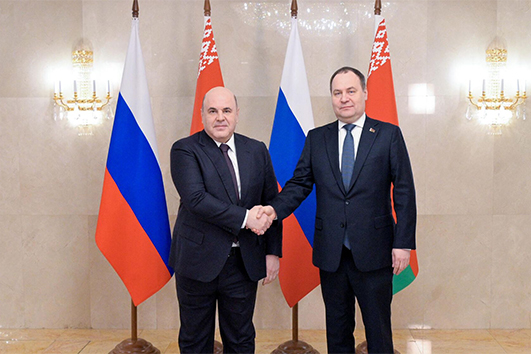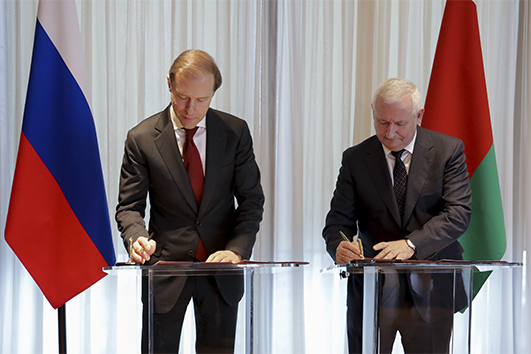The Start Has Been Given Towards the Practical Acquisition of the Status of an Aircraft-Industry Powers
On 15 April, during the visit of Prime Minister of the Republic of Belarus Roman Golovchenko to the Russian Federation and his talks with his Russian counterpart Mikhail Mishustin, an intergovernmental agreement related to the development and organisation of production of the Osvey twin-engine light multipurpose aircraft was signed. The historic document was signed by Russian Minister of Industry and Trade Denis Manturov and Deputy Prime Minister of Belarus Piotr Parkhomchik.
Thus, the idea of creating aviation equipment, worked out in detail by the specialists of the brotherly countries, turned into a concrete project and took the form of a regulatory act binding on the contracting parties. “The Union State has a large territory. We, of course, need the most advanced aircraft of different classes, different types to transport both passengers and cargo. That is why we are embarking on deep cooperation in aircraft industry on the basis of mutual benefit and equal use of technologies and, what is very important, common production capacities,” Mikhail Mishustin said.
Speaking about the significance of the signed document, Roman Golovchenko said: “The agreement was concluded, among other things, for the purposes of national security, as well as to ensure the technological sovereignty of both Belarus and Russia... Moreover, we have found a form in which Russia and Belarus actually invest in this project on a parity basis and, accordingly, will also be joint owners of the product that will be created during the implementation of this important project”.
Roman Golovchenko also specified that the agreement is part of the recently signed comprehensive programme of cooperation in aircraft industry between Belarus and the Russian Federation.
Mikhail Mishustin agreed with his colleague and added that such decisions are very important in the Union State, which is what the citizens of Russia and Belarus expect from the executive branch.
The document stipulates that the project will be financed by the parties on a parity basis. At the same time, each country will finance the creation of new production facilities and technical re-equipment at its own expense.
On the Belarusian side, the main burden of implementing this high-tech project, which is important for our country, will fall on 558 Aircraft Repair Plant JSC, an enterprise of the domestic military-industrial complex with a rich history, military and labour traditions. The management and labour collective of the plant are convinced that together with Russian specialists of Ural Works of Civil Aviation JSC, the main executor from the Russian side, it will be possible to successfully implement this ambitious and important project for the Union State.





 President of the Republic of Belarus
President of the Republic of Belarus
 Council of Ministers of the Republic of Belarus
Council of Ministers of the Republic of Belarus
 Information export support website
Information export support website
 National Law Portal of the Republic of Belarus
National Law Portal of the Republic of Belarus
 Unified State Register of Bankruptcy
Unified State Register of Bankruptcy
 Ministry of Defence of the Republic of Belarus
Ministry of Defence of the Republic of Belarus
 State Committee on Property of the Republic of Belarus
State Committee on Property of the Republic of Belarus
 Collective Security Treaty Organization
Collective Security Treaty Organization
 International satellite TV channel "Belarus 24"
International satellite TV channel "Belarus 24"
 Belarus Legal Forum
Belarus Legal Forum